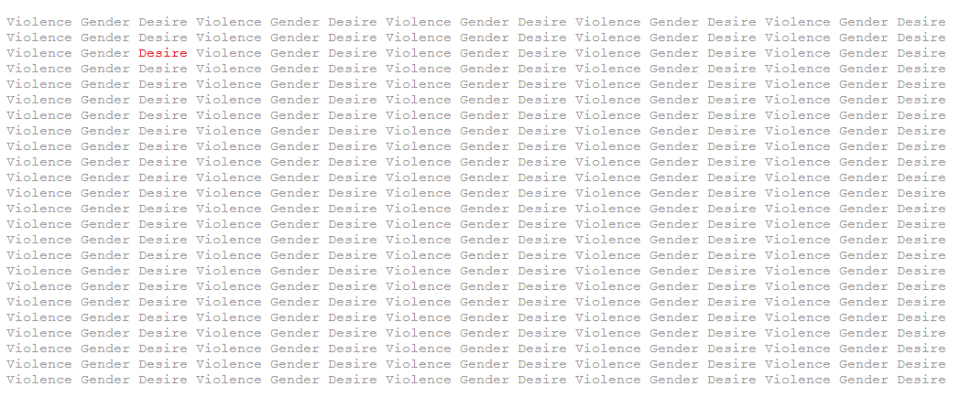
Event poster for “Violence, Gender, and Desire”
Violence, Gender, Desire
In Interviews • # Dalhousie, film, gender, Halifax
We spoke to Samantha Thompson, Miranda Jones, and Emma Stolpmann about the film screening on violence, gender, and desire that their class has planned in conjunction with the Saint Mary’s University Women’s Centre for the 16 Days of Activism Against Gender-Based Violence. The screening will consist of the short documentary, “Reframing the Montreal Massacre,” as well as Grey Area, a program of six short films exploring the complexity of sexual orientation.
AA: Can you explain the context in which this project / series of films came together? How did this series arise?
Samantha Thompson: This project was an assignment from our Desire in cinema class. Each student came up with their own film program, then we as a class voted on which one we would like to put up. Mine got chosen, so it started out as individual but as time went on different people had different ideas for the order of the films and other things that should be included, so it has really turned into a collaborative project.
AA: This series is scheduled to happen in conjunction with the 16 Days of Activism Against Gender-Based Violence. Could you say a little bit about how gender-based violence and sexual orientation are related? How might a reframing or re-understanding of sexual orientations work to end gender-based violence?
ST: Statistics show that queer women are more likely to experience gender-based violence and harassment. Re-framing our understanding of sexual orientations is crucial to end gender-based violence because the more educated people are on the topic the more likely they are to be accepting of other orientations. Also, more education on violence against women is never a bad thing.
AA: What power do you see film having in the process of breaking down institutionalized gender paradigms and stigma surrounding questions of gender?
Miranda Jones: This screening project helps to provide visibility for those who don’t normally see their narratives represented onscreen in mainstream cinema. The film ‘Reframing the Montreal Massacre’ is also particularly powerful in its analysis of media sources that reported on the attack at Ecole Polytechnique in 1989. Through viewing and discuss media institutions enforcing gender paradigms, the audience is asked to question current media outlets and question the way stories are being told.
AA: In your choice of films, are you hoping to convey a specific message, or are your intentions more along the lines of asking questions?
MJ: Definitely, the film screening’s title, The Grey Area, frames our intentions more in the realm of asking questions. Providing a range of experience of gender, sexual orientation and experiences of romance allows our audience to think about the spaces in between these films as well. Our professor Shannon Brownlee has encouraged us on multiple occasions to imagine what, in a ideal world, we would like to see on our screens. This screening definitely has this thought in mind.
AA: Did any of the films challenge or enhance your own understandings of sexual orientation?
MJ: Yes, particularly the film Practical Things by Kris and Lindy Boustedt. It’s a brief romantic interaction between two women meeting for the first time. It’s very voyeuristic, and an interesting attempt at finding a female gaze in film.
AA: In relation to the film “First Stories—Two-Spirited,” how do you see gender stereotypes/paradigms as playing into not only gender violence but also colonial domination? Further, in what ways can a reimagining of gender and sexuality work to decolonize our modes of being?
Emma Stolpmann: Gender stereotypes are very present in colonialism; these are stereotypes that date back to when the European settlers first encountered Native Americans and they are stereotypes that have stayed with us all these years. A reimagining of gender and sexuality can change how we act and our modes of being by changing how we think about and how we talk about Native American men and women. Recently, the missing and murdered Aboriginal women of Canada have come to light, our changing of minds can change how we discuss and solve this cultural horror.
AA: Will there be opportunity for discussion/dialogue after the films are screened?
ES: Yes, we will have a short discussion period after the films have been screened.
The event will be held on December 7 at 6:45pm in the Lindsay Room of the Halifax Central Library.
~
~